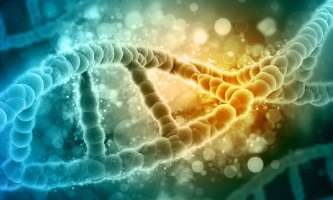Breast cancer gene holds key to personalised medicine and new drug development

Nottingham scientists have identified a new breast cancer gene which, when over-expressed or mutated, indicates which patients will benefit from chemotherapy.
The collaborative study – involving Nottingham University Hospitals NHS Trust, Nottingham Trent University and the University of Nottingham – is published in the journal Lancet Oncology .
The team, funded by the Nottingham Hospitals Charity and the John and Lucille van Geest Foundation, says the SPAG5 gene has the potential to provide a new targeted therapy for breast cancer treatment and to tailor treatment to the patient's tumour for the best chance of a good response.
Almost 1.7 million women are diagnosed with breast cancer worldwide each year, with more than half a million dying of the disease. 'Oestrogen receptor negative breast cancer' accounts for almost a third of all patients.
The study examined the expression of SPAG5 in more than 10,000 breast cancer samples donated by patients.
The scientists found that oestrogen receptor negative patients with SPAG5 positive tumours – who underwent surgery and anthracycline chemotherapy – were 60% more likely to be cured, compared to patients in this group who received no chemotherapy treatment.
Importantly, all of the oestrogen receptor negative, SPAG5 negative cases, were found to do the same as the SPAG5 positive patients who received no chemotherapy.
The fact that the treatment did not impact the outcome in the SPAG5 negative cases suggests that SPAG5 is a good indicator of treatment response to anthracycline - one of the most commonly used first line chemotherapy agents for oestrogen receptor negative breast cancer.
The work involved using machine-learning computer-based approaches to analyse the gene expression levels in more than 2,000 breast cancer genomes.
The approach identified candidate genes from the 48,000 in each genome. From these only 30 were selected for further study – the most significant of which was SPAG5. The importance of SPAG5 was validated in a further study of 8,000 breast cancer cases.
Graham Ball, Professor of Bioinformatics in Nottingham Trent University's John van Geest Cancer Research Centre, and a lead researcher on the study, said: "Research at Nottingham Trent University originally identified SPAG5 as an important molecule. Now we have shown that it is amplified in specific subtypes of breast cancer and that the gene and its associated protein are linked to a better outcome for patients and a better response to chemotherapy.
"This may mean that SPAG5 can be a new therapeutic target and a biological marker for the tailoring of breast cancer treatment and development of new therapeutics."
Professor Stephen Chan, consultant oncologist at Nottingham City Hospitals NHS Trust and a visiting professor at Nottingham Trent University, added: "SPAG5 is a marker of how fast the tumour is growing and how aggressive it is.
"When we looked back at data from patients who received treatment in the past, before anthracycline was in use, cases with high levels of SPAG5 did worst. Our research suggests such cases would have benefited from anthracycline chemotherapy.
"We are designing a clinical trial to use SPAG5 to select the best treatment for individual patients; it's all about personalised medicine.
"Our research is building towards this goal. With the continued support of the Nottingham Hospitals Charity and all the donors and fundraisers that continue to contribute to this effort, we will get there."
More information: Tarek M A Abdel-Fatah et al. SPAG5 as a prognostic biomarker and chemotherapy sensitivity predictor in breast cancer: a retrospective, integrated genomic, transcriptomic, and protein analysis, The Lancet Oncology (2016). DOI: 10.1016/S1470-2045(16)00174-1
















